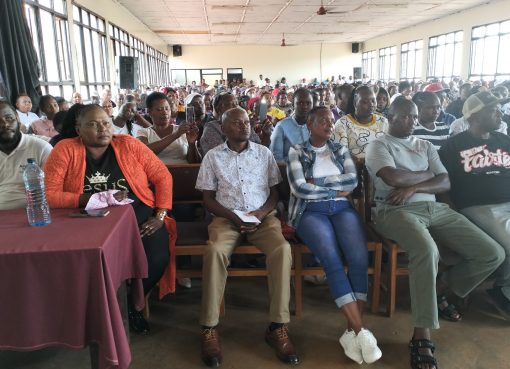Coffee farmers from 33 regions across the country will benefit from Sh.6.7 billion debt waiver by the government.
Cooperatives, Micro, Small and Medium Enterprises (MSME’s) Development Cabinet Secretary (CS) Simon Chelugui said that the Ministry prepared a Cabinet Memo which was approved to a tune of Sh.6.7 billion to support coffee farmers repay the owed debts.
“The Cabinet Memo included other support to coffee farmers like improvement of Coffee seedlings, repayment of old KPCU debts and support to emerging coffee growing areas with processing equipment to improve the quality of coffee marketed from such areas,” said Chelugui.
Chelugui speaking in Nairobi on Tuesday during a consultative meeting with coffee cooperative societies’ creditors said that the coffee subsector in Kenya is vital to the country’s economy, providing livelihoods to 800,000 farmers, 5 million indirect beneficiaries and contributes significantly to export foreign currency earnings.
He explained that the government will form a multi-agency validation team to analyze the submitted claims from cooperative societies and prepare a report to the National Treasury for release of funds.
“The exercise calls for honesty and openness on the part of the cooperative leaders and their creditors while preparing the debts and to avoid exaggeration. It is important to note that Cabinet approval emphasized that any falsification may lead to prosecution of those found culpable,” explained Chelugui.
Chelugui said that all creditors are required to provide a detailed report of the loans and advances issued to cooperative societies to the Commissioner for Cooperative Development by Thursday June 20, 2024.
He highlighted that the validation team will be guided by the parameters which include that the loans in question must have been processed through cooperative societies and not individual walk-in members.
“Other requirements are that the loan must have been fixed and approved by members in a duly convened general meeting, the Commissioner for Cooperative Development must have approved the borrowing, a list of benefitting members in case of advances to members as loans or farm inputs or for cooperative society infrastructure or operating overheads must be provided,” explained the CS.
He added that for all loans given, there must be a proof that the farmers’ coffee was given as collateral (coffee hypothecation) for recovery from sale proceeds.
Chelugui added that the government has been undertaking reforms through the executive order No. 2 of 2023 which reaffirms the government’s commitment on coffee, tea and dairy reforms. This has enabled the government to address outstanding challenges through policy, legal, and administrative interventions.
“The reforms include: Developed of the Coffee Policy 2023, Coffee Bill 2023, and Cooperatives Bill 2023, restructuring the Nairobi Stock Exchange that has enabled coffee cooperative unions to participate in the auction; So far 15 Cooperative Unions have been licensed and participate at the weekly trading floor of the auction,” said Chelugui.
He added that other initiatives in the reforms include operationalizing the Direct Settlement System (DSS) which has addressed delayed payments to farmers; separation of multiplicity roles by coffee players including milling, marketing and brokerage.
“We have also reformed licensing regime with various regulators dealing with specific licenses like AFA licensing Coffee dealers, County Government Licensing Millers while Capital Markets Authority licenses marketers at the NCE,” said Chelugui.
Additionally, the CS said that the reforms have enhanced the Cherry Advance Revolving Fund from Sh.2.7 billion to Sh.6.7 billion to enable increased payment to farmers from Sh.20 per kilo to Sh.80 per kilo; and Modernization of New KPCU as a miller and marketer of last resort.
By Joseph Ng’ang’a




